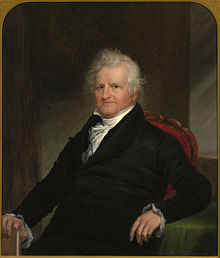Joseph Bradley Varnum | |
|---|---|
 | |
| President pro tempore of the United States Senate | |
| In office December 6, 1813 – February 3, 1814 | |
| Preceded by | William H. Crawford |
| Succeeded by | John Gaillard |
| 6th Speaker of the United States House of Representatives | |
| In office October 26, 1807 – March 3, 1811 | |
| Preceded by | Nathaniel Macon |
| Succeeded by | Henry Clay |
| United States Senator from Massachusetts | |
| In office June 29, 1811 – March 3, 1817 | |
| Preceded by | Timothy Pickering |
| Succeeded by | Harrison Gray Otis |
| Member of the U.S. House of Representatives from Massachusetts | |
| In office March 4, 1795 – June 29, 1811 | |
| Preceded by | Constituency established |
| Succeeded by | William M. Richardson |
| Constituency | 9th district (1795–1803) 4th district (1803–11) |
| Member of the Massachusetts Senate | |
| In office 1789–1795 | |
| Personal details | |
| Born | January 29, 1750/1751 Dracut, Province of Massachusetts Bay, British America |
| Died | September 21, 1821 (aged 70–71) Dracut, Massachusetts, U.S. |
| Resting place | Varnum Cemetery, Dracut |
| Political party | Democratic-Republican |
| Children | 12 |
| Signature |  |
| Military service | |
| Branch/service | Massachusetts Militia |
| Battles/wars | American Revolutionary War |

Joseph Bradley Varnum (January 29, 1750/1751 – September 21, 1821) was an American politician from Massachusetts. He served as a U.S. representative and United States senator, and held leadership positions in both bodies. He was a member of the Democratic-Republican Party.
Born in Dracut in the Province of Massachusetts Bay, Varnum was the son of farmer, militia officer and local official Samuel Varnum and Mary Prime. He received a limited formal education, but became a self-taught scholar. Varnum became a farmer, and at age 18 received his commission as a captain in the Massachusetts militia. He commanded Dracut's militia company during the American Revolution and remained in the militia afterwards, eventually attaining the rank of major general in 1805.
Varnum took part in the government of Massachusetts following independence, including as a member of the Massachusetts House of Representatives from 1780 to 1785 and a member of the Massachusetts State Senate from 1786 to 1795. Despite not being an attorney, Varnum also served as a judge, including terms as a Justice of the Massachusetts Court of Common Pleas and Chief Justice of the Massachusetts Court of General Sessions. He was a member of the U.S. House from 1795 to 1811, and was Speaker of the House from 1807 to 1811. Varnum served in the U.S. Senate from 1811 to 1817, and was the Senate's president pro tempore from 1813 to 1814.
After leaving the U.S. Senate, Varnum served in the Massachusetts State Senate until his death. He died in Dracut on September 21, 1821, and was buried at Varnum Cemetery in Dracut.